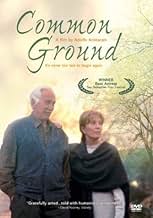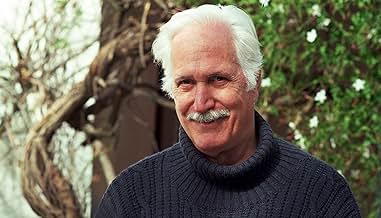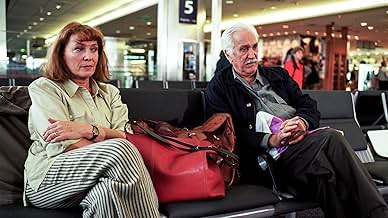In Buenos Aires, a few days before traveling to Spain with his beloved wife Liliana Rovira to visit their son Pedro, the leftist Literature professor Fernando Robles is compulsory retired in... Read allIn Buenos Aires, a few days before traveling to Spain with his beloved wife Liliana Rovira to visit their son Pedro, the leftist Literature professor Fernando Robles is compulsory retired in the University, and he concludes that it is impossible to live with his pension. The cris... Read allIn Buenos Aires, a few days before traveling to Spain with his beloved wife Liliana Rovira to visit their son Pedro, the leftist Literature professor Fernando Robles is compulsory retired in the University, and he concludes that it is impossible to live with his pension. The crisis in Argentina does not allow Fernando to get a new job, and his wife decides to sell her... Read all
- Director
- Writers
- Stars
- Awards
- 13 wins & 13 nominations total
- Director
- Writers
- All cast & crew
- Production, box office & more at IMDbPro
Featured reviews
"Lugares Comunes" is a very beautiful, critical, human, sensitive and real film about love, life, adaptation and convictions in the third age. The story takes place in Argentina, but could be in Brazil or any South American country, where in general people can not keep their status with their retirement pension, being forced to continue working to survive, or to fall from middle-class to very poor class. This touching narrative has a perfect pace and flows naturally, supported by the impressive performances of Federico Luppi and Mercedes Sampietro. All the characters are credible and beautiful (with the exception of the head of the university), and this movie is a gem. My vote is eight.
Title (Brazil): "Lugares Comuns"("Common Places")
Fernando and Lili have a son Pedro (Pablo Rago) who lives comfortably in Spain with his wife and two children. A leftist man of strong convictions, Fernando tells his son about his meager pension left to him by the university but refuses his assistance. Instead he berates him for abandoning his country and selling out to make money. When the couple returns to Argentina, they are forced to sell their apartment in the city, purchase a farm and bravely set out on a new style of living. Their adjustment to rural life has its moments of sadness but their striving to live out their lives with dignity and purpose is profoundly human. Though Common Ground does not reach the heights of Aristarain's A Place in the World, it is an honest film and one that celebrates the strength of a loving family.
Basic questions, with basic answers that not everybody is willing to hear. Common places where most of us try not to go.
This film is poetry into a movie. One of the best scripts contents of the Latin American cinema. Aristarain shows one more time to be one of the best ever Argentinean directors.
Take your time to enjoy it.
You probably have to come from Spain or Argentina to really pick up all the subtleties conveyed in the movie. However, the feelings and emotions the film explores are universal.
I really like Fernando Luppi (he has been involved in many many good films, like "Martín H", or "Nadie hablará de nosotras hasta que hayamos muerto"), but please note Mercedes Sampietro (still the President of the "Academia del Cine" in Spain), who plays the role of her life (so far) in this movie. What she does is something similar as to what Halle Berry shows in Monsters' Ball. Just watch the last minutes of the film, she doesn't speak, she doesn't need to...
Fernando Robles (Federico Luppi) is a writer and university professor in Buenos Aires who is informed before his planned trip to Madrid to visit his son Pedro (Carlos Santamaría) and daughter-in-law Natacha (Valentina Bassi) that he is being placed in early retirement: the crumbling government of Argentina cannot support such things as education! After an exquisite farewell of sage advice to his students on what is important in the role of a teacher, he goes home to his loving wife of many years Liliana (Mercedes Sampietro) to prepare for their journey to Madrid. At the airport Liliana senses sadness in Fernando and he confesses that he has been 'fired', that they have little money to live on in Buenos Aires: he covers his sadness by buying Liliana perfumes she loves. This couple is bonded so beautifully it makes us weep.
In Madrid the couple is forced to stay with the son and daughter but the closeness of this familial proximity is intolerable when Fernando informs his son of his financial situation. Pedro is cold and harsh and is in life for money and refuses to assist his parents. The couple leaves, returning to Argentina where they under advice from lawyer Carlos (Arturo Puig) sell their home and move to the country where they plan to grow grapes - a return to the purity of the land. But fate intervenes and the story ends in a manner that leaves the viewer sad but wiser.
The cast is sterling and the direction is first rate. This is one of those films that should be required viewing for many reasons, but especially for people who are approaching the time of retirement and the fear that holds. Highly recommended for a large viewing audience. In Spanish with English subtitles. Grady Harp
Did you know
- Quotes
Fernando Robles: Don't value your students based on their answers. Answers are not true, they seek a truth that will be only relative.
Details
Box office
- Gross worldwide
- $2,108,596
- Runtime
- 1h 48m(108 min)
- Color
- Sound mix

























